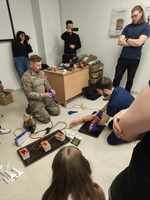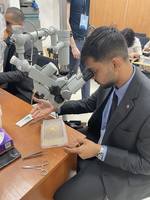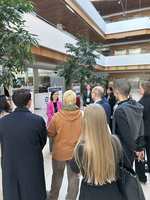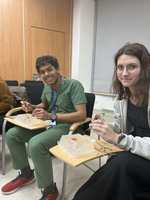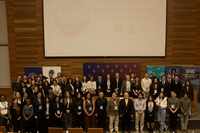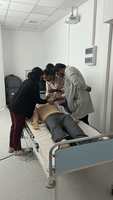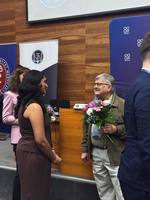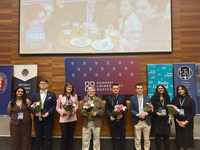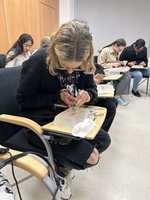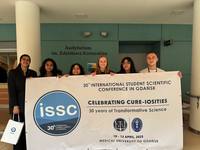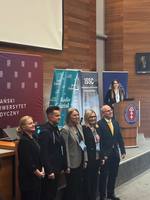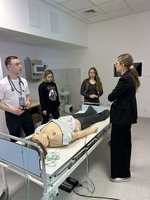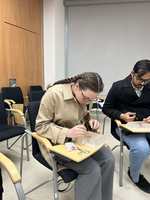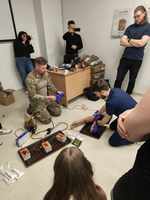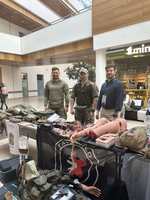30th International Student Scientific Conference - Key Moments and Achievements
9.06.2025
Studenckie Towarzystwo Naukowe (STN) is a student-led organisation designed to foster scientific collaboration among students through various activities for over 50 years now – namely science exhibitions, induction workshops, and conferences.
The International Student Scientific Conference is one such event that creates a platform for young researchers and healthcare professionals from around the globe to come together to collaborate on their empirical work with one and all. This pivots around networking, internationalization, and the promotion of student-led scientific endeavours.
This year marks the 30th edition of the conference, dated 10th – 12th April, with the theme – “Celebrating CURE-iosities: 30 Years of Transformative Science.” The aim was to present how far biomedical sciences have gained ground in the past 30 years. We have attempted to give our participants a well-rounded experience through a series of scientific sessions, lectures, interactive workshops, and networking discussions across different fields of study.
Notably, we were able to achieve certain milestones highlighting its impact within the scientific community. A total of 156 completed abstract submissions were received, out of which 96 were accepted nationally and 31 were accepted internationally. Moreover, there were 20 poster presentations and 107 oral presentations. This enabled productive discussions between our respected jury members and presenters. There were 15 workshops conducted, and we registered an enthralling participation with more than 60% of the workshops having no spots left.
This year’s edition of ISSC workshops offered hands-on training across a wide range of medical disciplines. Participants had an opportunity to learn using simulation models, structured exercises, and real or case-based scenarios. Topics included cardiovascular skills such as ECG interpretation and cardiac suturing. Emergency medicine was represented by workshops on acute abdomen management, foreign body removal in ENT, and massive bleeding control – conducted in collaboration with representatives from the Ministry of Defense, based on the Stop the Bleed model.
Participants had a chance to develop their surgical skills through sessions on laparoscopy, micro-suturing, knot-tying, and core needle biopsy. Neuroscience was explored through a neuro-oncology tumor simulation and a structured neurological examination workshop. Further sessions addressed dysmorphology, oncological emergencies, AI in healthcare (including chatbot creation), communication in clinical crises, inclusive healthcare, and health risk assessment.
We are sincerely grateful to all the Student Scientific Circles and professionals who contributed to making these workshops possible. Their involvement was crucial to the program’s diversity and quality. Special thanks to:- Student Scientific Circle Rare Diseases
- Studenckie Koło Naukowe Chorób Rzadkich
- Scientific Circle of Gastroenterology
- IFMSA – Poland Oddział Gdańsk
- ED Public Health SSC
- English Division Scientific Circle of Cardiac Surgery
- Scientific Circle of Artificial Intelligence in Medicine
- Student Scientific Circle of Psychology
- Student Scientific Circle of Emergency Medicine
- SKN Neurologii Dorosłych GUMed
- Scientific Circle of Otolaryngology
- ED Scientific Circle of Neurosurgery
- Breast Sarcoma Skin and Melanoma SKN
Their expertise and commitment helped ensure that this year’s ISSC workshops provided a dynamic, inclusive, and impactful learning experience for all participants.
Additionally, we had the opportunity to attend two very interesting lectures delivered by distinguished scientists.
On the first day, we had a chance to welcome Dr. Chiara Colli from the University of Milan. Her main research interest lies in the identification of determinants involved in the developmental pathways of psychiatric disorders, ranging from physiology to psychopathology, using a multi-level approach that includes clinical and biological data, in particular cognitive and neuroimaging ones. During her speech titled “Why is a multimodal approach important for understanding psychopathology?”, she explained how she works on her research using twin models, which provide an excellent platform for gaining insight into how much nature and nurture influence psychopathological development.
The second day’s lecture was delivered by Dr hab. Dorota Hoffman-Zacharska, who works at the Department of Medical Genetics at the Institute of Mother and Child (as Head of the Neurogenetics Laboratory) and the Institute of Genetics and Biotechnology at the Faculty of Biology, University of Warsaw. Her lecture – “Precision and personalized – genomic-driven medicine” – allowed us to dive into the diagnostic side of medicine. We learned about the new generation sequencing (NGS), how it’s different compared to the previously used Sanger method, as well as what advantages and opportunities it provides.
The 30th International Student Scientific Conference concluded with a landmark event – the “Legacy in Action” panel discussion. Bringing together six distinguished and illustrious speakers, namely Prof. Jacek Witkowski, Prof. Miłosz Jaguszewski, Dr. Jarosław Meyer-Szary, Dr. Justyna Kobiela, Dr. Szymon Zdanowski, and Dr. Shraddha Singh, the session offered a reflective and inspiring discussion on the evolution of ISSC over the past three decades.
Panelists shared insights into the conference’s key milestones, the challenges overcome, and its transformative role in shaping young scientists and academic communities. The session powerfully illustrated how far ISSC has come and highlighted the enduring value of student-run scientific conferences. These platforms not only foster research and academic dialogue but also cultivate leadership, collaboration, and innovation among student scientists, organisers, and academics alike.
More than a celebration of history, Legacy in Action was a testament to the strength of student-driven science and its continued potential to shape the future of research and education. Our objective for the upcoming years will be improving student engagement and encouraging scientific involvement not only through the congress but also via various pursuits. Information regarding the same will be posted on our social media handles, so feel free to keep an eye on our Instagram (@stngumed) and Facebook (https://www.facebook.com/stngumed).
In conclusion, the 30th International Student Scientific Conference was not just a commemoration of student-led organisation and research, but it was also an effort to take a significant step forward in building a network of individuals who are interested in research and development in healthcare.
